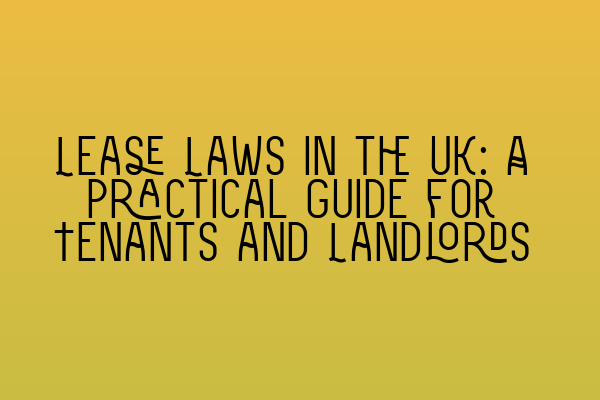Lease Laws in the UK: A Practical Guide for Tenants and Landlords
Welcome to SQE Property Law & Land Law blog! In this article, we will provide you with a comprehensive guide to lease laws in the UK, offering practical advice for both tenants and landlords. Whether you are a landlord renting out a property or a tenant looking to rent, understanding lease laws is crucial to protect your rights and ensure a smooth tenancy.
Let’s start by defining what a lease is. A lease is a legal agreement between a landlord and a tenant that outlines the terms and conditions of the rental arrangement. It details the rights and obligations of both parties, including rent payment, maintenance responsibilities, and duration of the tenancy.
As a tenant, it is important to thoroughly review the lease agreement before signing it. Take note of the following key points:
1. Rent Payment: Understand the amount of rent that needs to be paid, the frequency of payment, and the acceptable methods of payment. Knowing your financial obligations is crucial to avoid any disputes with your landlord.
2. Duration of the Tenancy: Determine the length of the lease and whether there are any provisions for renewal or termination. This will allow you to plan accordingly and avoid any unexpected changes in your living arrangements.
3. Deposit: Familiarize yourself with the terms regarding the security deposit. Understand the amount required, the circumstances under which it can be withheld, and the timeline for its return at the end of the tenancy.
4. Maintenance Responsibilities: Determine who is responsible for the maintenance and repairs of the property. Clarify any limitations on making changes to the property and seek permission for any alterations you plan to make.
5. Termination Clause: Be aware of the conditions under which the lease can be terminated by either party. Understanding the notice period and the implications of breaking the lease will help you avoid any legal issues down the line.
As a landlord, it is equally important to draft a lease agreement that protects your interests while adhering to the legal obligations. Consider the following points:
1. Legal Requirements: Ensure that your lease agreement complies with the relevant laws and regulations in the UK. Familiarize yourself with the Housing Act 1988 and the Landlord and Tenant Act 1985, which outline the rights and responsibilities of both landlords and tenants.
2. Rent: Clearly state the rental amount, payment schedule, and any penalties for late payments. Be transparent about any changes to the rent during the tenancy.
3. Repairs and Maintenance: Define the responsibilities of the tenant regarding property maintenance and repairs. Make sure to include a clause that obligates the tenant to report any damages or issues promptly.
4. Termination and Eviction: Include a termination clause that outlines the circumstances under which the lease can be terminated by either party. Address the eviction process in case of non-payment of rent or other breaches of the lease agreement.
5. Deposit Protection: Comply with the law by placing the tenant’s deposit in a government-approved deposit protection scheme. Provide the necessary information about the scheme to the tenant.
By understanding and including these key provisions in your lease agreements, you can avoid potential conflicts and protect your rights as either a tenant or a landlord. Additionally, seeking legal advice from a qualified solicitor can further ensure that your lease agreement is legally sound and enforceable.
At SQE Property Law & Land Law, we offer expert advice and assistance on lease laws in the UK. Our team of experienced solicitors can guide you through the complexities of lease agreements, ensuring that your rights are protected and your obligations are met. Contact us today for professional advice tailored to your specific needs.
If you found this article helpful, make sure to check out our related articles and resources:
– SQE 1 Practice Exam Questions
– SQE 1 Practice Mocks FLK1 FLK2
– SQE 2 Preparation Courses
– SQE 1 Preparation Courses
– SRA SQE Exam Dates
We hope this guide has provided you with valuable insights into lease laws in the UK. Remember, knowledge is power, and being well-informed can help you navigate the complexities of renting and leasing property.
